-
 Bitcoin
Bitcoin $85,153.7008
0.19% -
 Ethereum
Ethereum $1,611.9471
0.74% -
 Tether USDt
Tether USDt $0.9999
0.00% -
 XRP
XRP $2.0824
0.07% -
 BNB
BNB $594.8487
0.44% -
 Solana
Solana $141.0161
2.06% -
 USDC
USDC $0.9999
0.00% -
 Dogecoin
Dogecoin $0.1592
0.25% -
 TRON
TRON $0.2430
0.70% -
 Cardano
Cardano $0.6310
0.14% -
 UNUS SED LEO
UNUS SED LEO $9.3462
-0.44% -
 Chainlink
Chainlink $13.0583
1.67% -
 Avalanche
Avalanche $19.9002
3.45% -
 Stellar
Stellar $0.2464
0.71% -
 Toncoin
Toncoin $3.0068
0.59% -
 Shiba Inu
Shiba Inu $0.0...01238
1.46% -
 Sui
Sui $2.1560
0.93% -
 Hedera
Hedera $0.1659
-0.64% -
 Bitcoin Cash
Bitcoin Cash $338.2209
0.30% -
 Polkadot
Polkadot $3.9317
5.47% -
 Hyperliquid
Hyperliquid $18.1514
1.10% -
 Litecoin
Litecoin $76.7521
0.57% -
 Bitget Token
Bitget Token $4.5877
3.38% -
 Dai
Dai $0.9999
0.00% -
 Ethena USDe
Ethena USDe $0.9992
-0.01% -
 Pi
Pi $0.6419
-0.41% -
 Monero
Monero $216.9663
1.85% -
 Uniswap
Uniswap $5.3190
1.42% -
 Pepe
Pepe $0.0...07480
2.77% -
 OKB
OKB $50.8919
0.00%
Cryptocurrency Wallet Security Basics: Hot Wallets vs. Cold Wallets
Hot wallets offer convenience for frequent crypto transactions but are vulnerable to hacks; cold wallets provide superior security for long-term storage.
Apr 16, 2025 at 04:14 pm
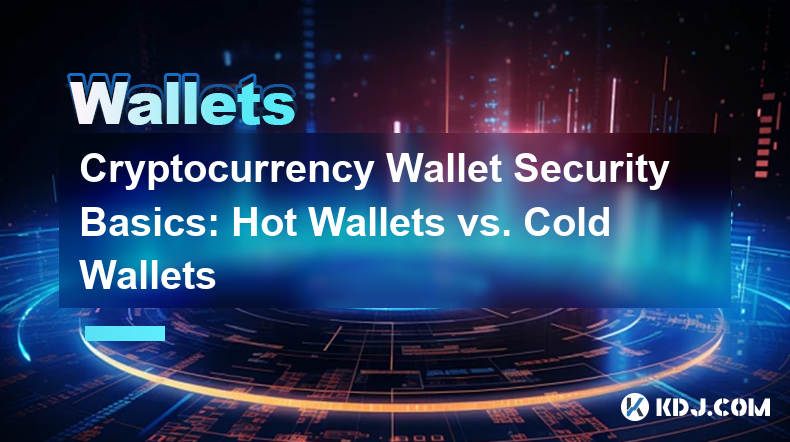
Cryptocurrency Wallet Security Basics: Hot Wallets vs. Cold Wallets
In the world of cryptocurrencies, securing your digital assets is paramount. One of the fundamental decisions you'll face is choosing between hot wallets and cold wallets. Understanding the differences between these two types of wallets, as well as their respective security implications, is crucial for safeguarding your investments. This article will delve into the basics of cryptocurrency wallet security, comparing hot wallets and cold wallets in detail.
What Are Hot Wallets?
Hot wallets are digital wallets that are connected to the internet. They are designed for ease of use and are typically used for frequent transactions. Hot wallets can be accessed through various devices such as smartphones, tablets, and computers. Examples of hot wallets include software wallets like Exodus, Electrum, and mobile wallets like Trust Wallet and Coinbase Wallet.
The primary advantage of hot wallets is their convenience. They allow you to quickly send and receive cryptocurrencies, making them ideal for everyday transactions. However, this convenience comes at a cost. Because hot wallets are connected to the internet, they are more vulnerable to hacking and cyber attacks. If a hacker gains access to your device or the wallet's server, they can potentially steal your funds.
What Are Cold Wallets?
In contrast, cold wallets are offline storage solutions that are not connected to the internet. Cold wallets are considered the most secure way to store cryptocurrencies because they are immune to online hacking attempts. Common types of cold wallets include hardware wallets like Ledger and Trezor, and paper wallets, which are physical documents containing your private keys.
The main advantage of cold wallets is their high level of security. Since they are not connected to the internet, they are protected from online threats such as phishing attacks, malware, and hacking attempts. However, cold wallets are less convenient for frequent transactions. To use the funds stored in a cold wallet, you need to connect it to the internet, which can be a cumbersome process.
Security Comparison: Hot Wallets vs. Cold Wallets
When comparing the security of hot wallets and cold wallets, it's important to consider several factors. Hot wallets are more susceptible to cyber attacks due to their internet connectivity. They are often targeted by hackers who use various techniques such as phishing, malware, and brute-force attacks to gain access to users' funds. To mitigate these risks, it's essential to use strong passwords, enable two-factor authentication (2FA), and keep your software up to date.
On the other hand, cold wallets offer a higher level of security because they are offline. They are not vulnerable to online attacks, making them an excellent choice for long-term storage of large amounts of cryptocurrencies. However, cold wallets are not entirely risk-free. Physical theft, loss, or damage to the wallet can result in the loss of your funds. To protect against these risks, it's advisable to store your cold wallet in a secure location and create backups of your private keys.
Choosing the Right Wallet for Your Needs
Selecting the right type of wallet depends on your specific needs and usage patterns. If you frequently buy, sell, or trade cryptocurrencies, a hot wallet may be more suitable due to its ease of use and accessibility. However, if you are looking to store large amounts of cryptocurrencies for the long term, a cold wallet is the better choice due to its superior security.
It's also possible to use a combination of both hot and cold wallets to balance convenience and security. For example, you can keep a small amount of cryptocurrencies in a hot wallet for daily transactions and store the majority of your funds in a cold wallet for long-term storage. This approach allows you to enjoy the benefits of both types of wallets while minimizing the risks.
Setting Up a Hot Wallet
Setting up a hot wallet is relatively straightforward. Here's a step-by-step guide to setting up a software wallet like Electrum:
- Download the wallet software: Visit the official website of the wallet provider and download the software for your operating system.
- Install the software: Follow the installation instructions to install the wallet on your device.
- Create a new wallet: Launch the wallet software and select the option to create a new wallet. You will be prompted to choose a wallet type and set a password.
- Generate a seed phrase: The wallet will generate a seed phrase, which is a list of words that can be used to recover your wallet. Write down the seed phrase and store it in a secure location.
- Receive and send cryptocurrencies: Once your wallet is set up, you can start receiving and sending cryptocurrencies. To receive funds, share your wallet address with the sender. To send funds, enter the recipient's address and the amount you want to send, then confirm the transaction.
Setting Up a Cold Wallet
Setting up a cold wallet, such as a hardware wallet like Ledger, involves a few more steps but provides enhanced security. Here's how to set up a Ledger hardware wallet:
- Purchase the hardware wallet: Buy a Ledger hardware wallet from the official website or an authorized retailer.
- Unbox and connect the device: Open the package and connect the Ledger device to your computer using the provided USB cable.
- Install Ledger Live: Download and install the Ledger Live software on your computer. This software is used to manage your hardware wallet.
- Initialize the device: Follow the on-screen instructions to initialize your Ledger device. You will be prompted to set a PIN code and generate a recovery phrase.
- Write down the recovery phrase: The recovery phrase is a list of 24 words that can be used to recover your wallet if it is lost or damaged. Write down the recovery phrase and store it in a secure location.
- Add cryptocurrency accounts: Use Ledger Live to add cryptocurrency accounts to your hardware wallet. You can add accounts for various cryptocurrencies such as Bitcoin, Ethereum, and others.
- Receive and send cryptocurrencies: Once your hardware wallet is set up, you can start receiving and sending cryptocurrencies. To receive funds, use the receive address provided by Ledger Live. To send funds, enter the recipient's address and the amount you want to send, then confirm the transaction on your Ledger device.
Best Practices for Wallet Security
Regardless of whether you choose a hot wallet or a cold wallet, there are several best practices you can follow to enhance the security of your cryptocurrency holdings. Use strong passwords and enable two-factor authentication (2FA) for your hot wallets. Regularly update your wallet software to protect against known vulnerabilities. For cold wallets, store your device and recovery phrase in a secure location, such as a safe or a secure deposit box. Avoid sharing your private keys or recovery phrase with anyone, and be cautious of phishing attempts and suspicious emails.
Frequently Asked Questions
Q: Can I use both hot and cold wallets at the same time?
A: Yes, you can use both hot and cold wallets simultaneously. Many cryptocurrency users keep a small amount of funds in a hot wallet for daily transactions and store the majority of their holdings in a cold wallet for long-term security. This approach allows you to balance convenience and security.
Q: How often should I back up my wallet?
A: It's a good practice to back up your wallet regularly, especially after making significant changes such as adding new funds or changing your password. For hot wallets, you should back up your seed phrase and store it in a secure location. For cold wallets, make sure to keep your recovery phrase safe and consider creating multiple backups in different secure locations.
Q: What should I do if I lose my cold wallet?
A: If you lose your cold wallet, you can recover your funds using the recovery phrase. Make sure you have stored your recovery phrase in a secure location. If you have created multiple backups, you can use one of them to restore your wallet on a new device. It's crucial to keep your recovery phrase confidential and secure to prevent unauthorized access to your funds.
Q: Are there any fees associated with using hot and cold wallets?
A: The fees associated with using hot and cold wallets vary depending on the specific wallet and the cryptocurrency you are using. Hot wallets typically do not charge fees for storing your cryptocurrencies, but you may incur transaction fees when sending funds. Cold wallets, such as hardware wallets, usually require an initial purchase cost, but they do not charge ongoing fees for storage. Transaction fees for sending funds from a cold wallet are similar to those from a hot wallet and depend on the cryptocurrency network.
Disclaimer:info@kdj.com
The information provided is not trading advice. kdj.com does not assume any responsibility for any investments made based on the information provided in this article. Cryptocurrencies are highly volatile and it is highly recommended that you invest with caution after thorough research!
If you believe that the content used on this website infringes your copyright, please contact us immediately (info@kdj.com) and we will delete it promptly.
- MoonPay CEO Ivan Soto-Wright Asks Congress to Keep State Regulators Involved in Stablecoin Regulation
- 2025-04-20 13:55:14
- Web3 AI Emerges as a Strong Contender, Outperforming Solana (SOL) and Cardano (ADA) by Delivering Impressive Returns and Enhanced Scam Protection
- 2025-04-20 13:55:14
- Telegram Fires Back, Exposing How French Authorities Only Recently Started Playing by EU Rules
- 2025-04-20 13:55:13
- Pi Network Releases Its Mainnet Migration Roadmap
- 2025-04-20 13:55:13
- A coin, which is going up for auction
- 2025-04-20 13:45:12
- $TRUMP coin has gained some momentum at the start of the long Easter weekend — but not for the right reasons.
- 2025-04-20 13:45:12
Related knowledge
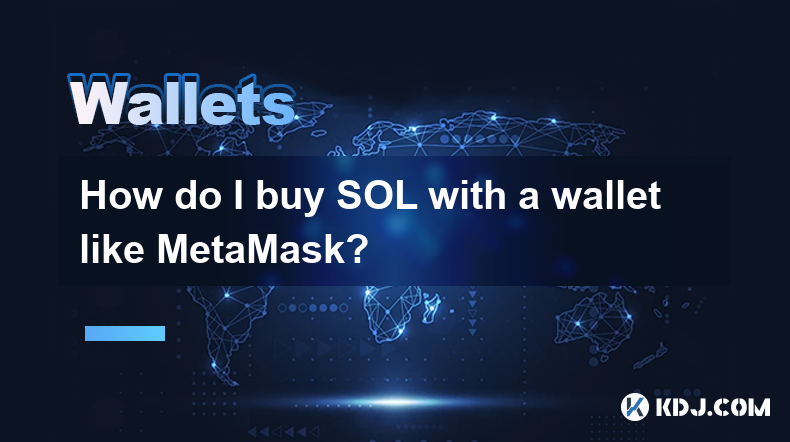
How do I buy SOL with a wallet like MetaMask?
Apr 20,2025 at 01:35pm
How do I Buy SOL with a Wallet Like MetaMask? Purchasing Solana (SOL) using a wallet like MetaMask involves a few steps, as MetaMask primarily supports Ethereum and Ethereum-based tokens. However, with the help of decentralized exchanges (DEXs) and some intermediary steps, you can acquire SOL. This article will guide you through the process in detail. S...
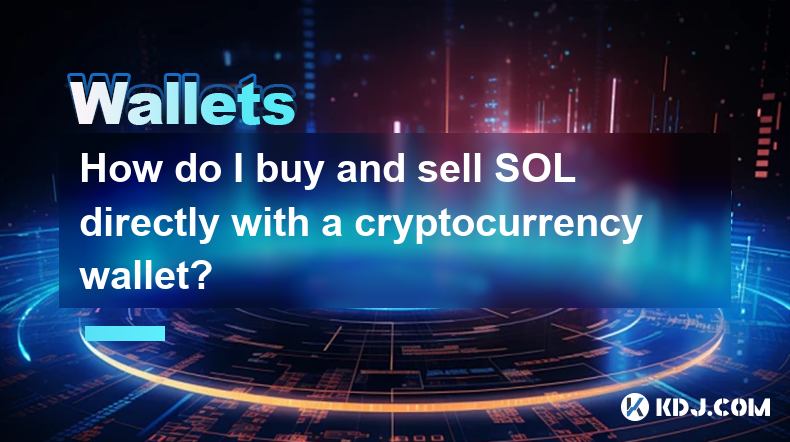
How do I buy and sell SOL directly with a cryptocurrency wallet?
Apr 19,2025 at 05:35pm
Introduction to Buying and Selling SOL with a Cryptocurrency WalletBuying and selling Solana (SOL) directly from a cryptocurrency wallet offers a convenient and secure way to manage your digital assets. Cryptocurrency wallets are essential tools for anyone looking to interact with the Solana blockchain. They allow you to store, send, and receive SOL wit...
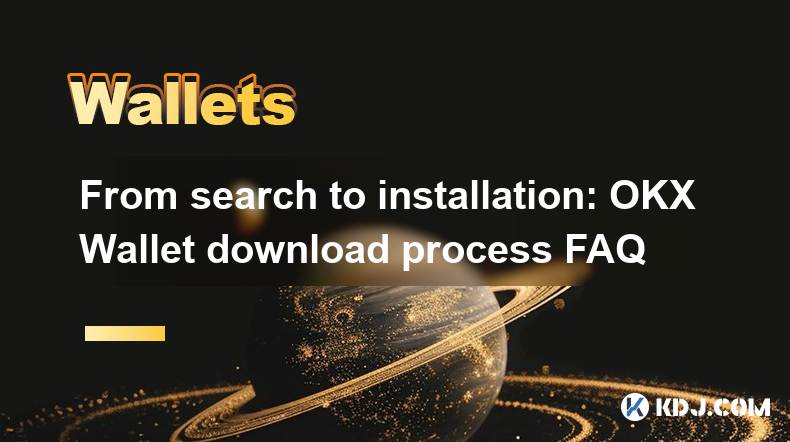
From search to installation: OKX Wallet download process FAQ
Apr 17,2025 at 02:00pm
The OKX Wallet is a popular choice among cryptocurrency enthusiasts for managing their digital assets securely and efficiently. Understanding the process from searching for the wallet to its installation can be crucial for new users. This article will guide you through the entire process, providing detailed steps and answers to frequently asked question...
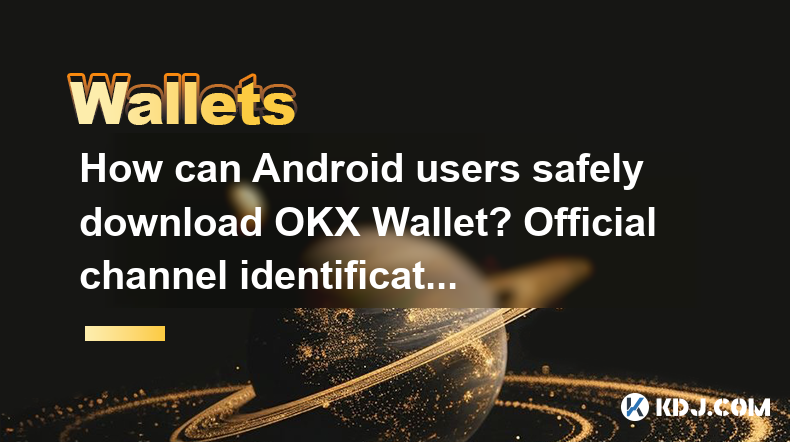
How can Android users safely download OKX Wallet? Official channel identification guide
Apr 19,2025 at 10:50pm
How can Android users safely download OKX Wallet? Official channel identification guide Ensuring the safety and security of your cryptocurrency assets begins with downloading apps from trusted sources. For Android users interested in using OKX Wallet, it's crucial to identify and use the official channels to avoid downloading malicious software. This gu...
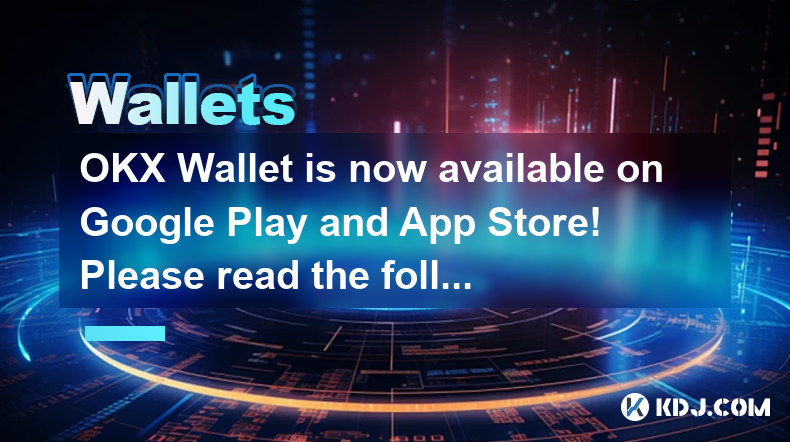
OKX Wallet is now available on Google Play and App Store! Please read the following points before downloading
Apr 18,2025 at 10:21pm
OKX Wallet has recently become available on both the Google Play Store and the Apple App Store, marking a significant step forward in accessibility for users interested in managing their cryptocurrencies. Before you proceed to download the app, it's crucial to understand some key points to ensure a smooth and secure experience. This article will guide y...
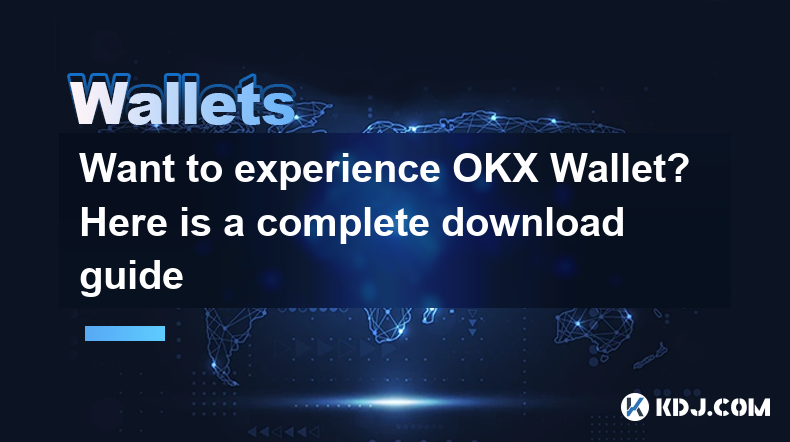
Want to experience OKX Wallet? Here is a complete download guide
Apr 19,2025 at 09:00pm
Want to experience OKX Wallet? Here is a complete download guide Are you interested in diving into the world of cryptocurrencies with the OKX Wallet? This comprehensive guide will walk you through the process of downloading and setting up your OKX Wallet on various devices. Let's get started and ensure you have everything you need to manage your digital...

How do I buy SOL with a wallet like MetaMask?
Apr 20,2025 at 01:35pm
How do I Buy SOL with a Wallet Like MetaMask? Purchasing Solana (SOL) using a wallet like MetaMask involves a few steps, as MetaMask primarily supports Ethereum and Ethereum-based tokens. However, with the help of decentralized exchanges (DEXs) and some intermediary steps, you can acquire SOL. This article will guide you through the process in detail. S...

How do I buy and sell SOL directly with a cryptocurrency wallet?
Apr 19,2025 at 05:35pm
Introduction to Buying and Selling SOL with a Cryptocurrency WalletBuying and selling Solana (SOL) directly from a cryptocurrency wallet offers a convenient and secure way to manage your digital assets. Cryptocurrency wallets are essential tools for anyone looking to interact with the Solana blockchain. They allow you to store, send, and receive SOL wit...

From search to installation: OKX Wallet download process FAQ
Apr 17,2025 at 02:00pm
The OKX Wallet is a popular choice among cryptocurrency enthusiasts for managing their digital assets securely and efficiently. Understanding the process from searching for the wallet to its installation can be crucial for new users. This article will guide you through the entire process, providing detailed steps and answers to frequently asked question...

How can Android users safely download OKX Wallet? Official channel identification guide
Apr 19,2025 at 10:50pm
How can Android users safely download OKX Wallet? Official channel identification guide Ensuring the safety and security of your cryptocurrency assets begins with downloading apps from trusted sources. For Android users interested in using OKX Wallet, it's crucial to identify and use the official channels to avoid downloading malicious software. This gu...

OKX Wallet is now available on Google Play and App Store! Please read the following points before downloading
Apr 18,2025 at 10:21pm
OKX Wallet has recently become available on both the Google Play Store and the Apple App Store, marking a significant step forward in accessibility for users interested in managing their cryptocurrencies. Before you proceed to download the app, it's crucial to understand some key points to ensure a smooth and secure experience. This article will guide y...

Want to experience OKX Wallet? Here is a complete download guide
Apr 19,2025 at 09:00pm
Want to experience OKX Wallet? Here is a complete download guide Are you interested in diving into the world of cryptocurrencies with the OKX Wallet? This comprehensive guide will walk you through the process of downloading and setting up your OKX Wallet on various devices. Let's get started and ensure you have everything you need to manage your digital...
See all articles























































































